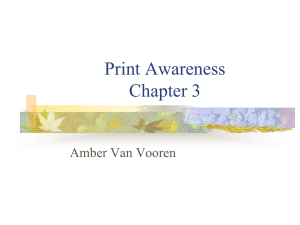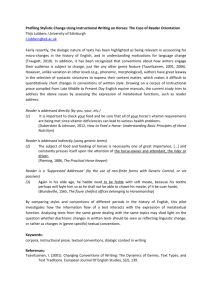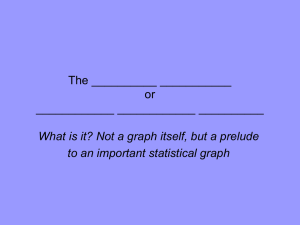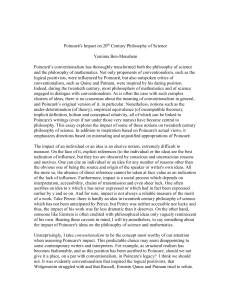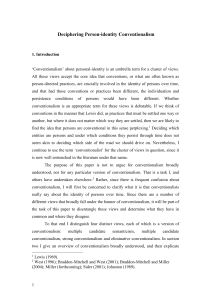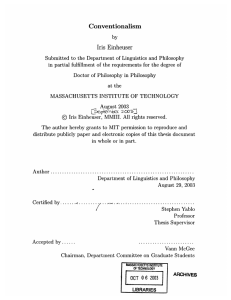PHIL2622 Conventionalism 2012
advertisement
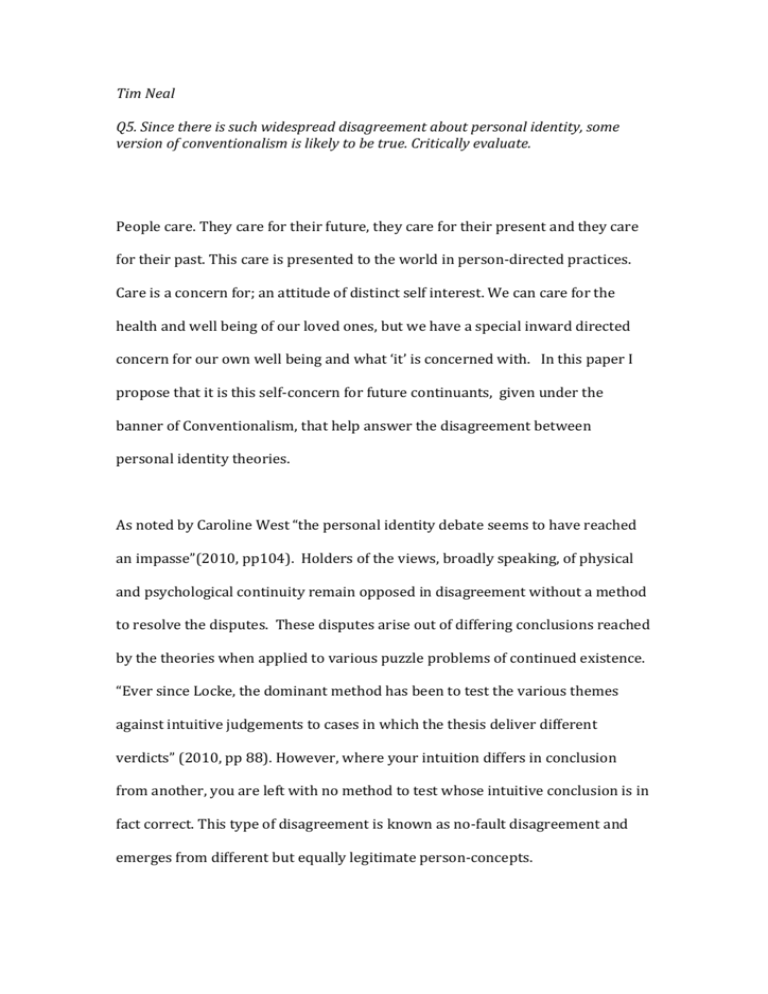
Tim Neal Q5. Since there is such widespread disagreement about personal identity, some version of conventionalism is likely to be true. Critically evaluate. People care. They care for their future, they care for their present and they care for their past. This care is presented to the world in person-directed practices. Care is a concern for; an attitude of distinct self interest. We can care for the health and well being of our loved ones, but we have a special inward directed concern for our own well being and what ‘it’ is concerned with. In this paper I propose that it is this self-concern for future continuants, given under the banner of Conventionalism, that help answer the disagreement between personal identity theories. As noted by Caroline West “the personal identity debate seems to have reached an impasse”(2010, pp104). Holders of the views, broadly speaking, of physical and psychological continuity remain opposed in disagreement without a method to resolve the disputes. These disputes arise out of differing conclusions reached by the theories when applied to various puzzle problems of continued existence. “Ever since Locke, the dominant method has been to test the various themes against intuitive judgements to cases in which the thesis deliver different verdicts” (2010, pp 88). However, where your intuition differs in conclusion from another, you are left with no method to test whose intuitive conclusion is in fact correct. This type of disagreement is known as no-fault disagreement and emerges from different but equally legitimate person-concepts. Broadly speaking Conventionalism is the concept that “personal identity is constructed out of person-directed practices of the individual and/or the community”(Braddon-Mitchell & Miller, 2010, pp1). Person-directed practices include activities such as regret for past actions, planning for the future of your person, distributing property over time, ethical accountability for actions past and future. All of these activities arise due to the care each individual has for their own welfare, their own perception of what they refer to as ‘themselves’. Logical Conventionalism as described by Braddon-Mitchell and Miller is the view that persons are conventional constructs. The construct is made up of “settled conventions” and “unsettled conventions”. Settled conventions go by without notice. They are so explicitly tied to the notion of person that there is no need to explain their role. It is the unsettled conventions that we use to solve puzzle cases like teletransportation and brain transplants to robots. It is my assertion that Conventionalism can avoid the no-fault disagreement problem as it is a theory quite distinct in its origin and does not try and offer a direct comparison to the traditional theories. In fact, Conventionalism takes physical and psychological continuity theories and uses these concepts to explain how an individual sees their own person. These concepts are examples of settled conventions. West describes Conventionalism as a theory that puts our psychological and social lives into the central position in our lives – we ‘care’ about caring about things. I see this as a central strength of this theory. Personal identity is of utmost importance to the individual in question. For any theory to dismiss the views of any in the population of people is to miss the point of the exercise. This is not merely semantics. We as people care about these issues and they have important flows onto legal and personal outcomes for which we may have to contend. As an individual I am the one contending with the ‘I’. It is how I see myself during internal contemplation, in relation to others around me, and how I see myself fitting into the world. The fact that my body is a continuum, and that I have memory of some psychological past is obvious to me and I do not question its validity. These elements are not a part of the conscious ‘I’. They are taken for granted. Braddon-Mitchell & Miller describe these continuers as settled conventions. It makes sense that some form of physical and psychological continuance is important for the future existence of the person. It is these elements that we as individuals consider to be an important part of the ‘I’. Conventionalism recognizes the importance of both elements. In doing this it answers the problem of disagreement. Rather than being limited to the weakness of individually opposed concepts of physical versus psychological, Conventionalism brings them together to be related with the ‘I’ in question. As we mentioned before via Caroline West, we test theories of personal identity through the use of special cases and see the verdicts that arise. Puzzle cases are those instances where Physical Continuity and Psychological Continuity give us different verdicts. At this point disagreement arises. In puzzle cases Conventionalists raise unsettled conventions to help us find resolution. Consider a human foetus in the debate around abortion. Unsettled conventions such as: the adult woman carrying a foetus has the right to decide what happens to her body, and/or the living person has a greater right to survival then the unborn. These unsettled conventions give us ways in which we can settle a puzzle problem. A similar approach can be taken with the example of euthanasia: any human person with agency can decide the right time to end their life. The most important thing about these unsettled conventions is that it recognizes the individuals who refer to themselves as ‘persons’ care. They care about their personhood and factors that will affect that personhood. This sounds very much like a relativist concept. This is acknowledged by Braddon-Mitchell and West (2001, pp59).1 Merricks (2001, pp13) argues against Conventionalism saying proponents must “deny the existence of a fully functioning conscious human organism is sufficient for the existence of one of us”. Merricks is opposed to the idea that Conventionalists are reducing human persons to mere conventions. This is an error of understanding in the particular use of the term convention. It is a convention in Australia to drive on the left hand side of the road. It could have been the right hand side as in other countries. In the end we really do not fuss about it, it is mere convention. But, in relation to personal identity we care very much about the convention. Also, Conventionalism is attempting to define the person which makes the “fully functioning” organism. It is the collection of personal-directed practices which collectively create a fully functioning human person. As discussed earlier Conventionalists are happy to say that settled conventions would make up the ‘fully functioning’ human organism on most This is not seen as a problem, but a phenomena to be explained through the discussion of ‘transfiguration’. Although interesting, this is out of the scope of this paper. 1 occasions and that it is only in puzzle cases where Merricks’ assumption of a fully functioning person would be problematic. In a puzzle case we must ensure we define what a fully functioning person is. This allows us to make conclusions of the persistence of the person in question. Merricks also argues that in order to create a person, you first need a person, as it would take a person to conceive the idea of conventions. He is saying that conventionalism is thus circular in argument. I agree that some conventions are like this but not all are and I argue that this does not present a problem. Conventions such as self-regard for the future are prima facie to the existence of a human animal as well as a human person. It is possible to imagine that the human species would not have survived without such a convention. The human animal then names these existent elements as a convention with the rise of consciousness. These relate to many settled conventions. Thus the human person exists without the need of a first person. These pre existent conventions are merely labeled as such with unsettled conventions being described as time and circumstances require. It has been suggested that certain conventions may be a hardwired biological fixture and therefore certainly a priori. This claim is yet to be proven but the fact that it is being hypothesized demonstrates the integral nature of settled conventions. Rather than a vicious circle I see an outward scribing spiral of understanding of personhood. I put forward that, even with the criticism of the likes of Merricks, Conventionalism is a solution to the personal identity disagreement. Rather than relying on singular opposing concepts with our intuition as the only guide, it places the way we actually live our lives to the fore. It is more a phenomenological approach. Humans are animals that care. They care about caring. This is a mental function. This care is displayed in behaviour and attitudes to behaviour. Heidegger’s ‘Dasein’ operated in the world (physical place and cultural rules). Remove the world and Dasein has no context. Conventionalism reveals personal identity in the world. Bibliography Deciphering Person-identity Conventionalism, Kristie Miller How to be a Conventional Person, The Monist 87(4):457-474, David BraddonMitchell & Kristie Miller, 2004 Metaphysics Lecture 4, Kristie Miller, 2012 Oxford Dictionary of Philosophy, Simon Blackburn, Oxford University Press, 2008 Personal Identity, Stanford Encyclopedia of Philosophy, E. Olson, 2010 Personal Identity, Conceptual Analysis & No Fault Disagreement, Worldviews, Science & Us: Studies of Analytical Metaphysics: a selection of topics from a Methodological Perspective, pp87, Caroline West, 2010. Realism and Personal Identity over Time, Philisophical Perspectives 15 Metaphysics, edited by James Tomberlin, Trenton Merricks, 2001 Society, Self & Knowledge, Phillip Quadrio Lecture Notes, 2011 Temporal Phase Pluralism, Philosophy and Phenomenological Research Vol. LXII, No. 1, January 2001, David Braddon-Mitchell and Caroline West.

